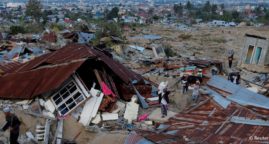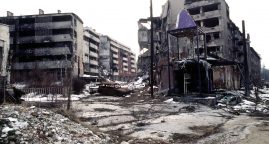Forced displacement worldwide at its highest in decades
Article published on UNHCR website on 06/19/2017 by Adrian Edwards
UNHCR’s annual Global Trends report says an unprecedented 65.6 million people were uprooted from their homes by conflict and persecution at the end of 2016.
War, violence and persecution have uprooted more men, women and children around the world than at any time in the seven-decade history of UNHCR according to a report published today.
The UN Refugee Agency’s annual Global Trends study found that 65.6 million people were forcibly displaced worldwide at the end of 2016 – a total bigger than the population of the United Kingdom and about 300,000 more than last year.
It noted that the pace at which people are becoming displaced remains very high. On average, 20 people were driven from their homes every minute last year, or one every three seconds – less than the time it takes to read this sentence.
“It speaks louder than ever to the need for solidarity and common purpose in preventing and resolving crises, and ensuring together that the world’s refugees, internally displaced and asylum-seekers are properly protected and cared for while solutions are pursued.”
Particularly heartbreaking is the plight of children, who make up half the world’s refugees, and continue to bear a disproportionate burden of the suffering, mainly because of their heightened vulnerability.
Tragically, 75,000 asylum claims were received from children travelling alone or separated from their parents, among them youngsters like Tareq, 16, who dodged armed combatants to walk out of Syria into neighbouring Turkey.
“There was no future where we lived,” he told UNHCR. “There was no university and no work. There were troops grabbing young children like me, and they send them to war, and they get killed. I wanted to study.”
Last year, much of the news coverage focused on refugee resettlement to developed countries, including efforts by some states to restrict access and even erect border barriers.
However, figures in the report showed that, worldwide, most refugees – 84 per cent – were in developing or middle-income countries at the end of 2016, with one in every three (4.9 million people) being hosted by the world’s least developed countries.
This huge imbalance reflects several things including the lack of consensus internationally when it comes to hosting refugees, and the proximity of many poor countries to regions of conflict.
It also illustrates the need for countries and communities supporting refugees and other displaced people to be properly resourced and supported, the absence of which can cause instability, have consequences for life-saving humanitarian work or lead to secondary displacement.
UNHCR estimates that at least 10 million people were without a nationality or at risk of statelessness at the end of 2016. However, data recorded by governments and communicated to UNHCR were limited to 3.2 million stateless people in 75 countries.
Faced with another year of a record displacement, devastating the lives of millions of men, women and children, one thing is clear: “We have to do better for these people,” Grandi said. “For a world in conflict, what is needed is determination and courage, not fear.”
Related Articles
Aquarius Migrants, Order of Malta’s Medical Team on Dattilo: “In their eyes the hope for a better future”
06/18/2018. “In their eyes the hope for a better future”
Indonesia earthquake and tsunami: Malteser International supports reconstruction of health facilities
10/05/2018. Malteser International has made emergency funds available to deliver essential relief materials to the surrounding communities.
There Are No Real ‘Safe Zones’ and There Never Have Been
03/30/2017. “In a very short space of time, those designated safe areas can become very unsafe,” Chris Boian, spokesman for the U.N. Refugee Agency.






